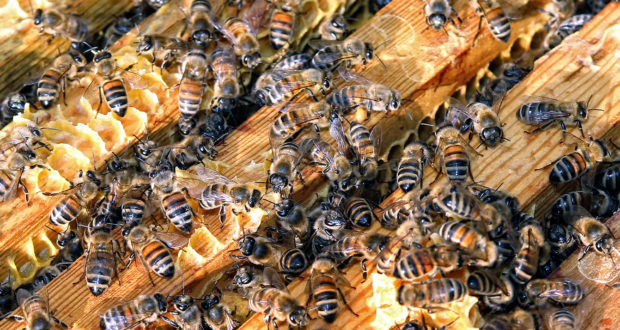Given their propensity to sting perceived threats, bees aren’t exactly the most popular creatures in the animal kingdom. Despite this bad publicity, bees play a major and irreplaceable role in the production of the world’s food supply. Now a new report suggests that hemp might be useful in maintaining the world’s dwindling honey bee population.
The Quest for Food
This research comes courtesy of scientists from Colorado State University. The team focused on hemp because bees pollinate this plant; given this fact, the researchers contend that greater hemp production might boost the number of honey bees across the United States.
For this report, the study authors focused on hemp plants grown in northern Colorado. In this part of the country, the hemp flowering process begins in late July, and lasts through the end of September. During this same timeframe, the researchers note that other pollinator-friendly crops are in short supply, giving bees few options when it comes to collecting pollen. Even though hemp does not produce nectar, it does release significant amounts of pollen, which bees use to produce food for their colonies.
Over the course of the study, the researchers collected over 2,000 bees loitering around hemp plants. In all, the report documented 23 different types of bees, though most of the bees observed were identified as European honeybees. Given these findings, the team reach the conclusion that “hemp in the agroecosystem supports pollinators.”
The Missing Bees
You might not be a big fan of bees, but these flying insects are absolutely vital for the world’s stockpiles of food. Consider that roughly a third of the food produced in the world relies on bee pollination. It is for this reason that the worldwide decline of the honey bee population should cause concern.
A report from the Ohio State University’s Department of Entomology underscored the severity of this problem, noting that “since 2006, commercial beekeepers in the United States have reported honey bee colony loss rates averaging 30 percent each winter — startling, when compared to historical loss rates of 10 to 15 percent.” Some possible explanations given for this alarming trend are increased urban populations along with the growing prevalence of of herbicides, insecticides and pesticides.
 Natural Knowledge 24/7 Educate yourself with nutrition, health and fitness knowledge.
Natural Knowledge 24/7 Educate yourself with nutrition, health and fitness knowledge.






